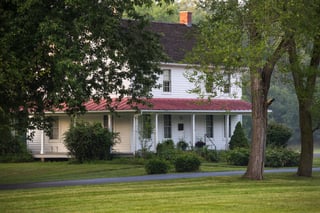Harriet Tubman National Historical Park is a US historical park in Auburn and Fleming, New York, associated with the life of Harriet Tubman. It comprises three properties: the Harriet Tubman Home for the Aged, in Auburn; the nearby Harriet Tubman Residence (just across the city/town line in Fleming); and the Thompson A.M.E. Zion Church in Auburn. They are located at 180 and 182 South Street, and 90 Franklin Street, respectively. The Zion Church unit is administered by the National Park Service (NPS), while the South Street properties, including a historic barn and a visitor center, are jointly managed and operated by both the NPS and the Harriet Tubman Home, Inc. The church also works with the NPS in park operations. The Harriet Tubman Grave in nearby Fort Hill Cemetery is not part of the park. The group of properties also makes up a National Historic Landmark, the first parcel having been declared in 1974, with two others added in 2001. Tubman was a major conductor on the Underground Railroad, and known as "the Moses of her people". She moved to Auburn with her parents after spending eight to ten years in St. Catharines, Ontario. She continued working as a suffragist, and worked all her life to care for others who were unable to care for themselves. The Harriet Tubman Home for the Aged is the house where she fulfilled her dream of opening a home for indigent and elderly African-Americans. In 1911 she was admitted there, herself, and remained there until her death in 1913. The Harriet Tubman Residence was Tubman's home during much of the time she lived in Auburn, from 1859 through 1913. The land was sold to her in 1859 by then-Senator William H. Seward. Thompson A.M.E. Zion Church is an African Methodist Episcopal Zion Church where Harriet Tubman attended services. Later in her life, she deeded the Home for the Aged to the church, for it to manage after her death. From Wikipedia
